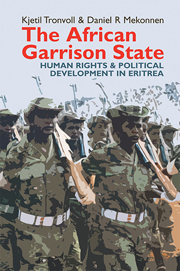Book contents
- Frontmatter
- Contents
- List of Acronyms and Abbreviations
- Preface
- Map 1 Provinces, Main Towns and Ethno-linguistic Groups of Eritrea
- 1 Introduction: The Eritrean Garrison State
- 2 Judicial Development in Independent Eritrea: Legal Pluralism and Political Containment
- 3 Rule of Law(lessness): The Special Court and the Judiciary
- 4 Democratic Curtailment: ‘Never Democracy, Always Control!’
- 5 Obliterating Civil Society: Denying Freedom of Organisation and Expression
- 6 The Eritrean Gulag Archipelago: Prison Conditions, Torture and Extrajudicial Killings
- 7 Everyday Life of Detention and Disappearances: Vulnerable Groups in a Population Under Siege
- 8 Minority Marginalisation: EPLF's Policies of ‘Cultural Superiority’
- 9 Diversity Diminished: Targeting the Kunama Minority Group
- 10 The Militarisation of Eritrean Society: Omnipresent and Never-Ending Military Service
- 11 Eritrea: Towards a Transition?
- Bibliography
- Index
6 - The Eritrean Gulag Archipelago: Prison Conditions, Torture and Extrajudicial Killings
Published online by Cambridge University Press: 05 October 2014
- Frontmatter
- Contents
- List of Acronyms and Abbreviations
- Preface
- Map 1 Provinces, Main Towns and Ethno-linguistic Groups of Eritrea
- 1 Introduction: The Eritrean Garrison State
- 2 Judicial Development in Independent Eritrea: Legal Pluralism and Political Containment
- 3 Rule of Law(lessness): The Special Court and the Judiciary
- 4 Democratic Curtailment: ‘Never Democracy, Always Control!’
- 5 Obliterating Civil Society: Denying Freedom of Organisation and Expression
- 6 The Eritrean Gulag Archipelago: Prison Conditions, Torture and Extrajudicial Killings
- 7 Everyday Life of Detention and Disappearances: Vulnerable Groups in a Population Under Siege
- 8 Minority Marginalisation: EPLF's Policies of ‘Cultural Superiority’
- 9 Diversity Diminished: Targeting the Kunama Minority Group
- 10 The Militarisation of Eritrean Society: Omnipresent and Never-Ending Military Service
- 11 Eritrea: Towards a Transition?
- Bibliography
- Index
Summary
INTRODUCTION
Eritrea is a country re-born out of suffering and human rights abuses. Its independence was hard won in 1993 after a 30-year-long war of liberation (Cliffe and Davidson 1988; Connell 1993; Iyob 1995). The massive and widespread human rights abuses experienced by the Eritrean people suffering under the yoke of the Derg military regime of Ethiopia, made them determined that they would ‘never kneel down’ in their struggle against oppression (Firebrace and Holland 1987).
It is cause for despondency that the oppression and massive human rights abuses, now committed by their liberation hero-turned-dictator, President Isaias Afwerki, persist in Eritrea today. Promises of democracy and freedom offered by the liberation front (EPLF/PFDJ) during the war and at independence have all been broken. Thousands of Eritreans are languishing in ‘secret’ detention camps throughout the country, government critics, veteran liberation fighters, civil servants, peasants, students, journalists, and religious believers alike. No group or individual is unaffected – men and women, young and old, Christian and Muslim, rural and urban, educated and uneducated, all are liable to be regarded as a threat to the regime and thus susceptible to arrest, torture and disappearance (see Chapter 7). Eritrea, in the second decade of the twenty-first century, is a nation held hostage by its own government, with a population denied basic human rights and freedoms. Estimates of the number of political prisoners or victims of detention without trial and enforced disappearances, given by different sources, including Eritrean refugees and exiled civil society representatives, vary between 10,000 and 30,000.
- Type
- Chapter
- Information
- The African Garrison StateHuman Rights and Political Development in Eritrea, pp. 92 - 106Publisher: Boydell & BrewerPrint publication year: 2014

